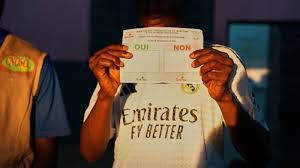
Guinea’s National Autonomous Observatory for the Supervision of the Referendum (ONASUR) has described the country’s constitutional referendum of 21 September as “generally peaceful,” while urging authorities to address key challenges before future elections.
In a preliminary report released on Monday, ONASUR, led by its president, presented an overview of the voting process both inside Guinea and in 34 embassies and consulates abroad.
The assessment was carried out in line with Article 12 of the law governing the organisation of the referendum.
Supervisors deployed across prefectures and urban municipalities highlighted several key findings. Most polling stations opened on time, though some experienced short delays linked to late delivery of electoral materials.
Polling staff were largely present, despite a handful of absences.
Access to polling stations was generally assured, with many voters able to cast their ballots without major obstacles. While the lack of suitable facilities for people with disabilities was noted, ONASUR reported that specific measures were taken to ensure their participation.
The Observatory praised the strong turnout, noting that voting took place in “a climate of serenity and peace.” Security was reinforced by law enforcement, and minor incidents did not disrupt the overall process. The closure of polling stations was also completed without major issues.
In its report, ONASUR acknowledged ongoing collaboration with civil society platforms and other electoral observation missions, which began on the eve of the referendum.
The body issued several recommendations, including improving mechanisms for reporting results and strengthening the training of polling staff in preparation for future elections.
ONASUR also appealed directly to citizens, urging them to reject violence and prioritise national unity.
“The construction of our national edifice requires the primacy of the collective interest. We invite our compatriots to turn away from any act of violence or provocation, in the interest of peace and social cohesion,” the statement read.



